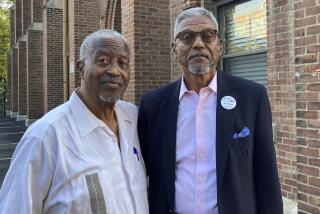Another Item in Iraq’s Bag of Terrors : U.N. unearths plan for spreading radioactivity through conventional weapons
- Share via
U.N. weapons inspectors have discovered yet another surprise in Saddam Hussein’s little shop of horrors, this time evidence of work on a radiological weapon that was designed to spread deadly radioactive material using conventional rather than nuclear explosives. Rolf Ekeus, chief of the U.N. special commission established at the end of the Persian Gulf War to find and destroy Iraq’s nuclear, chemical and biological weapons, says it’s unclear for now how much progress had been made on developing the radiological weapon. His deputy, Charles Duelfer, did note that “it would take no great leap of technological prowess to create such a weapon.” Postwar investigations have uncovered shocking proof that Iraq had secretly produced huge stocks of chemical weapons, that it had invested heavily in viral and plant-based toxins for biological warfare and that it may have been just months away from developing a nuclear device. These discoveries were made with a minimum of cooperation from Iraq, despite its promise to provide complete disclosure of its clandestine weapons programs. The radiological weapon under development apparently would have involved packing bomb casings or missile warheads with radioactive material that would be scattered over a wide area by conventional explosives. At the time of the Gulf War, Iraq had a large number of medium-range missiles, many of which it launched against Israel and Saudi Arabia, and it was working on long-range missiles. The radiological warhead would have been one more terror weapon in its arsenal. Ekeus’ report to the Security Council preceded that body’s regular 60-day review of the mandatory U.N. sanctions that were voted after Iraq invaded Kuwait in August, 1990. Among the conditions for easing the sanctions are that Iraq fully disclose its clandestine weapons programs, that those arms be destroyed and that Baghdad cooperate with U.N. monitoring to prevent banned weapons from again being built. Repeated evidence that Iraq has withheld information helps assure that the sanctions will remain in place. Baghdad often reminds the world of the hardship and suffering the sanctions have brought the Iraqi people. The Security Council has responded with an offer to allow Iraq to sell billions of dollars worth of oil a year if the revenues are devoted chiefly to importing food and medical supplies. Hussein has rejected this offer, huffing that it would violate Iraqi sovereignty. Meanwhile, by continuing to hide much about his secret weapons projects he fuels suspicions that Iraq has not given up the idea of waging aggressive war. He has left the Security Council no alternative but to keep the sanctions in force.
More to Read
Sign up for Essential California
The most important California stories and recommendations in your inbox every morning.
You may occasionally receive promotional content from the Los Angeles Times.













